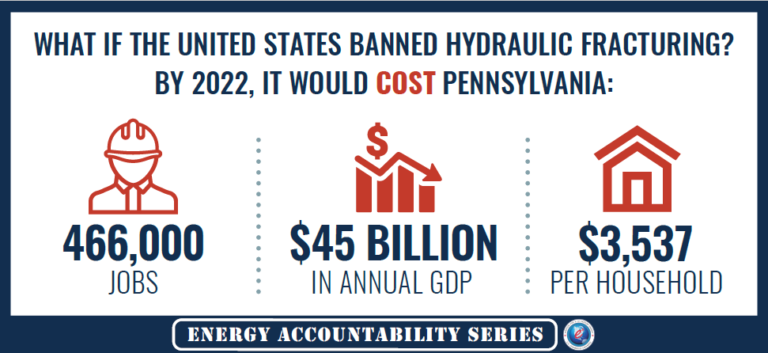For more than a decade, natural gas development has generated unprecedented opportunities to provide sustainable and broad-based economic and environmental benefits to our region and the nation.
A few politicians, however, have proposed to ban the safe technological process of hydraulic fracturing. As the candidates continue to push this misguided, dangerous policy, voters, elected officials, and energy experts are warning that such a plan would devastate the economy, threaten to reverse environmental progress, and jeopardize America’s energy security.
Increased production unlocked by hydraulic fracturing and horizontal drilling has put the U.S. on course to become a net energy exporter starting in 2020, according to the EIA’s forecast. This shift in energy outlook has boosted American energy security, and created sustained economic growth, all while delivering home energy savings and considerable environmental progress.
Recognizing these many benefits, the Williamsport Sun-Gazette’s editorial board criticized the proposal:
“Fracking is responsible for the new energy boom in America. It has been the primary way to extract natural gas from the Marcellus Shale in Pennsylvania, much of it right here in Lycoming County and neighboring counties. It benefits all of us, not just those in states where enormous quantities of natural gas are being produced.”
Across the Commonwealth, we are seeing new job opportunities and investment in a sector that’s the backbone of our economy. Significant projects currently are underway thanks to the abundance of affordable natural gas and natural gas liquids, including the construction of the Shell Petrochemicals Complex in Beaver County and the $200 million expansion of the Marcus Hook Industrial Complex in Delaware County.
That’s one of many reasons “voters fear economic impact of abrupt end to fracking,” according to a Rasmussen Reports national survey.
In Pennsylvania, enacting such a policy would halt the economic growth spurred by the shale revolution, MSC’s Dave Spigelmyer told The Wall Street Journal:
“In the last three decades, we’ve been writing obituaries for manufacturing. And in the last four or five years, we’ve been writing birth announcements up and down the Appalachian Basin because of our newfound supplies of energy.”
A 2016 Chamber of Commerce report found that such a policy would result in the loss of hundreds of thousands of good-paying Pennsylvania jobs, a $45 billion annual reduction in state GDP and a cost of living increase of $3,500 per household.

The Commonwealth’s oil and natural gas industry supports more than 300,000 direct and indirect jobs, including many among the region’s union building trades, according to a PricewaterhouseCoopers analysis. In fact, Pittsburgh was recently ranked by Commercial Café as one of the “most successful” Rust Belt city comebacks, citing the “steady supply of well-paying, blue-collar jobs” from the Marcellus shale industry.
Darrin Kelly, Pittsburgh firefighter and head of the Allegheny Fayette Labor Council, emphasized this fact to Selena Zito of the Washington Examiner:
“The natural gas industry employs well over 40,000 people just in this region alone. Countless more indirectly, providing economic opportunity for generations of families and communities that had been hollowed out by the demise of manufacturing and coal in this area.”
Earlier this month, MSC president Dave Spigelmyer testified to natural gas’ important role in a clean energy economy in front of a House Small Business Committee subpanel. Shortly after, he highlighted the importance of energy policy in an op-ed in The Hill, “Public policy should support, not eliminate, technology behind shale gas revolution”:
“America’s pursuit of a clean energy future must prioritize innovation, job growth and a sustainable economy. As our elected leaders grapple with how to best achieve this, they would do well to look to the benefits of natural gas as experienced in Pennsylvania.
Supporting a thriving natural gas industry — from production to pipeline deployment to its growth in electricity generation — should be a core focus of any public policy discussions aimed at building upon the progress our industry has realized for Pennsylvania and the nation.”
Here are a few of the remarks from commentators who have spoken out against these poor policy proposals:
“A fracking ban surely ranks as one of the most irresponsible promises of the campaign so far, and it would be a terrible idea even if the situation in the Middle East had not just reminded us of fracking’s strategic benefits.”
– Charles Lane, editorial writer at The Washington Post
“Fracking is a popular political target today, but targeting fracking is also irresponsible. It is about more than just cheap gasoline. It is about cleaner air right now, about a healthy domestic economy and about controlling our own geopolitical strategies.”
– Ellen R. Wald, Ph.D., senior fellow at the Atlantic Council’s Global Energy Center
“This would have major implications on the market for the U.S. economy, for jobs growth and everything, and not good news for energy security, because for example U.S. natural gas provides a lot of security to the markets.”
– Fatih Birol, executive director of the International Energy Agency
Recent blogs:




